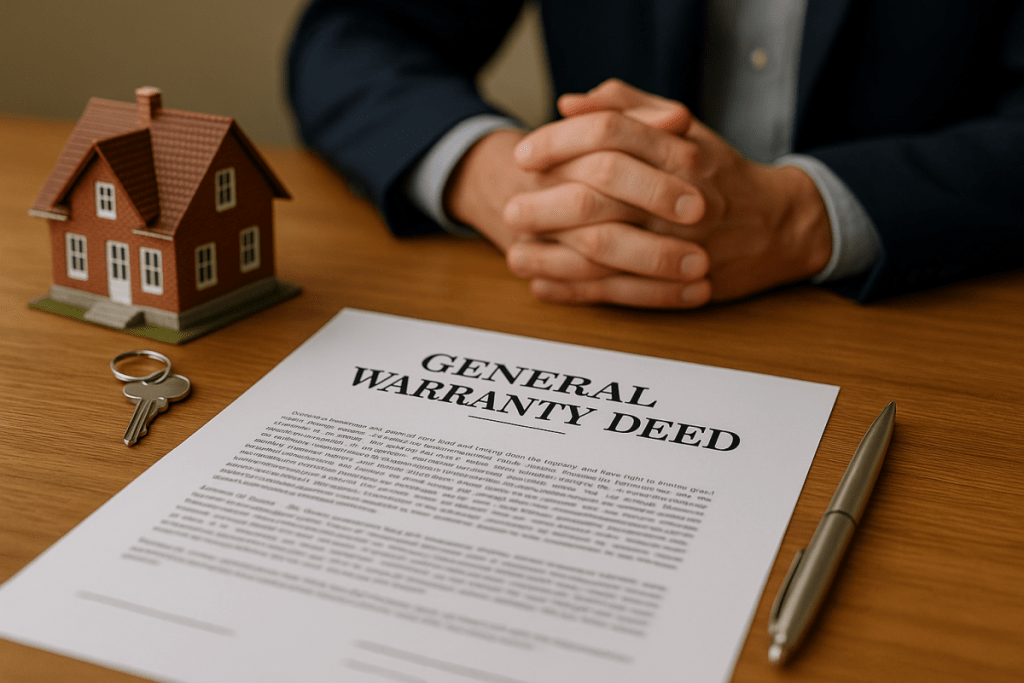What is a General Warranty Deed?
When you buy or sell a home in Georgia, one of the most important documents signed at closing is the deed. It is the legal instrument that transfers ownership of the property from one person to another. Among the various types of deeds used in real estate transactions, the General Warranty Deed offers the highest level of protection for buyers, making it one of the most common and trusted forms of property transfer in the state. Let’s answer the question: What is a General Warranty Deed?

What Is a General Warranty Deed?
A General Warranty Deed is a legal document that conveys full ownership of a property to the buyer and guarantees that the seller has clear, marketable title to the property. In simpler terms, it means the seller is promising that there are no hidden ownership claims, liens, or other title defects, not just during their period of ownership but going back through the entire history of the property. This broad protection is what makes the General Warranty Deed the most comprehensive type of deed available.
When you receive a property by General Warranty Deed, you can rest assured that the seller has taken responsibility for the entire chain of ownership. If a previous owner failed to pay taxes, recorded an unpaid mortgage, or granted a right of way without disclosure, the seller providing a General Warranty Deed can be held legally accountable for resolving those issues.
The Key Promises Within a General Warranty Deed
Under Georgia law, a General Warranty Deed typically includes several core covenants, or promises, made by the seller to the buyer. These covenants establish the legal guarantees that protect the new owner’s rights.
- Covenant of Seisin: The seller guarantees that they legally own the property and have the right to transfer it.
- Covenant Against Encumbrances: The seller promises that there are no liens, unpaid taxes, easements, or other burdens on the property except those already disclosed in the deed.
- Covenant of Quiet Enjoyment: The buyer will not be disturbed by anyone who later claims a superior ownership interest in the property.
- Covenant of Further Assurances: The seller agrees to take any necessary actions in the future to correct defects in title that may arise.
- Covenant of Warranty Forever: The seller stands behind the title for as long as the buyer owns the property, and even for future owners who inherit or buy it from the buyer.
Each of these covenants works together to ensure that ownership is clean, secure, and free of unexpected legal challenges. That level of assurance is particularly valuable for homebuyers who are investing their savings and future into one of the biggest purchases of their lives.
How It Differs from Other Types of Deeds
Not all deeds provide the same level of protection. Understanding how the General Warranty Deed compares to other common types of deeds can help buyers and sellers make informed choices during a real estate transaction.
Special Warranty Deed: Unlike a General Warranty Deed, a Special Warranty Deed only guarantees that the property was free of defects or claims during the seller’s ownership period. It does not protect against title issues from previous owners. This type of deed is often used in commercial transactions or by banks selling foreclosed properties.
Quitclaim Deed: A Quitclaim Deed provides no warranties at all. It simply transfers whatever interest the seller may have, if any, without promising that the title is clear. Quitclaim Deeds are often used between family members, to correct title errors, or to remove a person from ownership after a divorce.
For most standard home purchases, the General Warranty Deed remains the preferred and safest option for the buyer, since it provides protection against both past and present claims.
Recording and Legal Effect
Once the closing is complete, the General Warranty Deed is signed, notarized, and recorded in the county’s public land records. In Macon and throughout Bibb County, this recording is handled through the Clerk of Superior Court. Recording the deed officially places the buyer’s ownership on public record and protects against future disputes over the property’s title.
It is important to remember that the deed itself does not guarantee ownership automatically. The title search and title insurance obtained before closing work together with the General Warranty Deed to ensure the buyer’s rights are fully protected. The combination of these safeguards helps prevent costly legal issues and provides peace of mind to new homeowners.
Why It Matters in Georgia Real Estate
Georgia real estate transactions rely heavily on clear documentation and proper recording. A General Warranty Deed gives buyers a strong legal foundation, protecting them from surprises and future claims. It is especially important in historic areas like Macon, where property lines and ownership histories can date back more than a century. Ensuring that title records are accurate and unbroken helps maintain both the integrity of neighborhoods and the confidence of today’s buyers.
For sellers, offering a General Warranty Deed can also make a property more attractive. It demonstrates transparency and signals to buyers that the property’s history is clear, which can help a transaction move forward with fewer delays and smoother negotiations.
Final Thoughts
Whether you are buying your first home, selling a historic estate, or investing in Middle Georgia property, understanding the type of deed being used is essential. A General Warranty Deed provides unmatched protection for buyers and reflects the confidence and responsibility of a seller who stands behind their property’s title. Before closing, always review your documents carefully and work with your real estate professional and closing attorney to ensure that every detail is correct and properly recorded.




